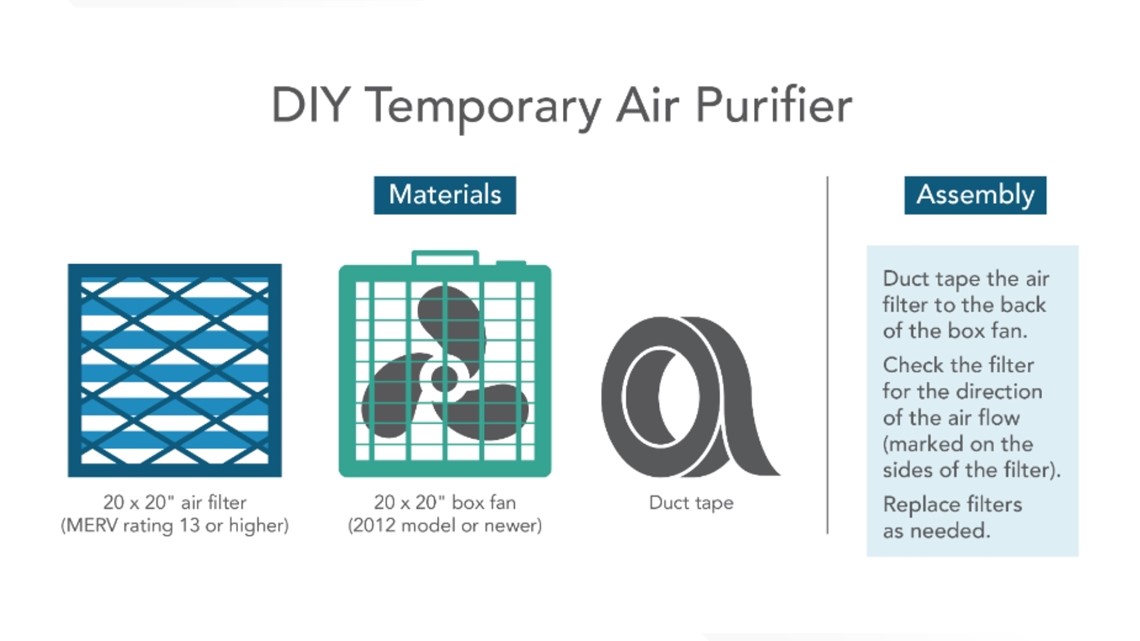The key to filtering out wildfire smoke in your home is using a high grade air filter and replacing it frequently.
When wildfires are burning, state and local health departments often direct people to stay inside since smoke can make the air unhealthy to breathe.
Some people, including health officials in Oregon, have recommended running your air conditioner to filter out wildfire smoke from within your home. VERIFY looked into whether it can help.
THE QUESTION
Can air conditioners filter out wildfire smoke from within your home?
THE SOURCES
- The American Society of Heating, Refrigerating and Air Conditioning Engineers (ASHRAE)
- The California Air Resources Board (CARB)
- Environmental Protection Agency (EPA)
THE ANSWER
![]()
Yes, air conditioners can filter out wildfire smoke from within your home, if you use high enough grade filters and replace them frequently.
WHAT WE FOUND
Wildfire smoke, and the pollutants it contains, can linger in the air for weeks or even months, depending on the weather and size of the fire, the California Air Resources Board (CARB) says.
When air quality deteriorates due to wildfire smoke, CARB recommends that people reduce their exposure and avoid the harmful effects of smoke by staying indoors with windows and doors closed.
But, even if your windows and doors are closed, wildfire smoke particles can still enter your home through small openings, cracks, or bathroom and kitchen fans that vent to the outdoors, according to the Environmental Protection Agency (EPA).
Upgrade your filters
Air conditioners cool air from indoors by first running it through a filter, the American Society of Heating, Refrigerating and Air Conditioning Engineers (ASHRAE) told VERIFY. You can purchase air filters for these systems from home improvement stores like Home Depot and should replace them often.
Filters are rated on a scale of 1 through 16 using Minimum Efficiency Reporting Values (MERVs). A higher number means the filter is more effective at catching particles like those found in wildfire smoke.
Both the EPA and ASHRAE say people should buy a filter with a MERV rating of 13 or higher to filter smoke out of the air inside their homes. The filter should also be replaced at least every two days since it will be catching many particles, ASHRAE added. In normal conditions, filters should usually be replaced every 30 to 90 days, depending on the type that you’re using, Home Depot says.
Most furnaces and HVAC systems can accommodate MERV 13 filters, but it can sometimes be difficult to tell since HVAC systems aren’t commonly labeled with filter recommendations. The EPA recommends contacting an HVAC technician if you are unsure about whether a higher efficiency filter will work with your system.
Check air circulation
Generally, residential air conditioners circulate air from inside the home, rather than drawing in outside air. But some central air systems may bring in some outside air through a vent called a fresh air intake. The EPA recommends closing that vent, which is typically located on the outside of your home, or turning the system to recirculate mode.
CARB also says people should set the fans on their thermostats to “on” to ensure the air is being constantly filtered, instead of the “auto” function that runs the system intermittently.
If you don’t have air conditioning
People without air conditioning can still take steps to filter wildfire smoke out of their homes.
The EPA says you can purchase a portable air cleaner that does not make ozone. Manufacturers sometimes refer to ozone as “activated oxygen, super oxygenated, or energized oxygen, which implies that ozone is a healthy kind of oxygen,” according to CARB. But ozone is only partially effective at cleaning the air when used at “extremely high, unsafe levels” that poses health risks, the agency says.
If portable air cleaners aren’t available or affordable, CARB suggests making a temporary air purifier for the inside of your home by using a box fan, filter with a MERV rating of 13 or higher, and duct tape. You’ll duct tape the air filter to the back of the box fan and replace filters as needed.


There is “limited data available on how well DIY air cleaners filter smoke particles,” and the EPA does not recommend the routine use of them as a “permanent alternative” to other products.
During wildfire conditions, CARB also warns against activities that increase indoor air pollution, such as burning candles, using gas stoves and vacuuming. Additionally, people should avoid running swamp coolers or whole house fans while wildfire smoke is in the air.
The VERIFY team works to separate fact from fiction so that you can understand what is true and false. Please consider subscribing to our daily newsletter, text alerts and our YouTube channel. You can also follow us on Snapchat, Twitter, Instagram, Facebook and TikTok. Learn More »
Follow Us
Want something VERIFIED?
Text: 202-410-8808
.png)









 English (US) ·
English (US) ·